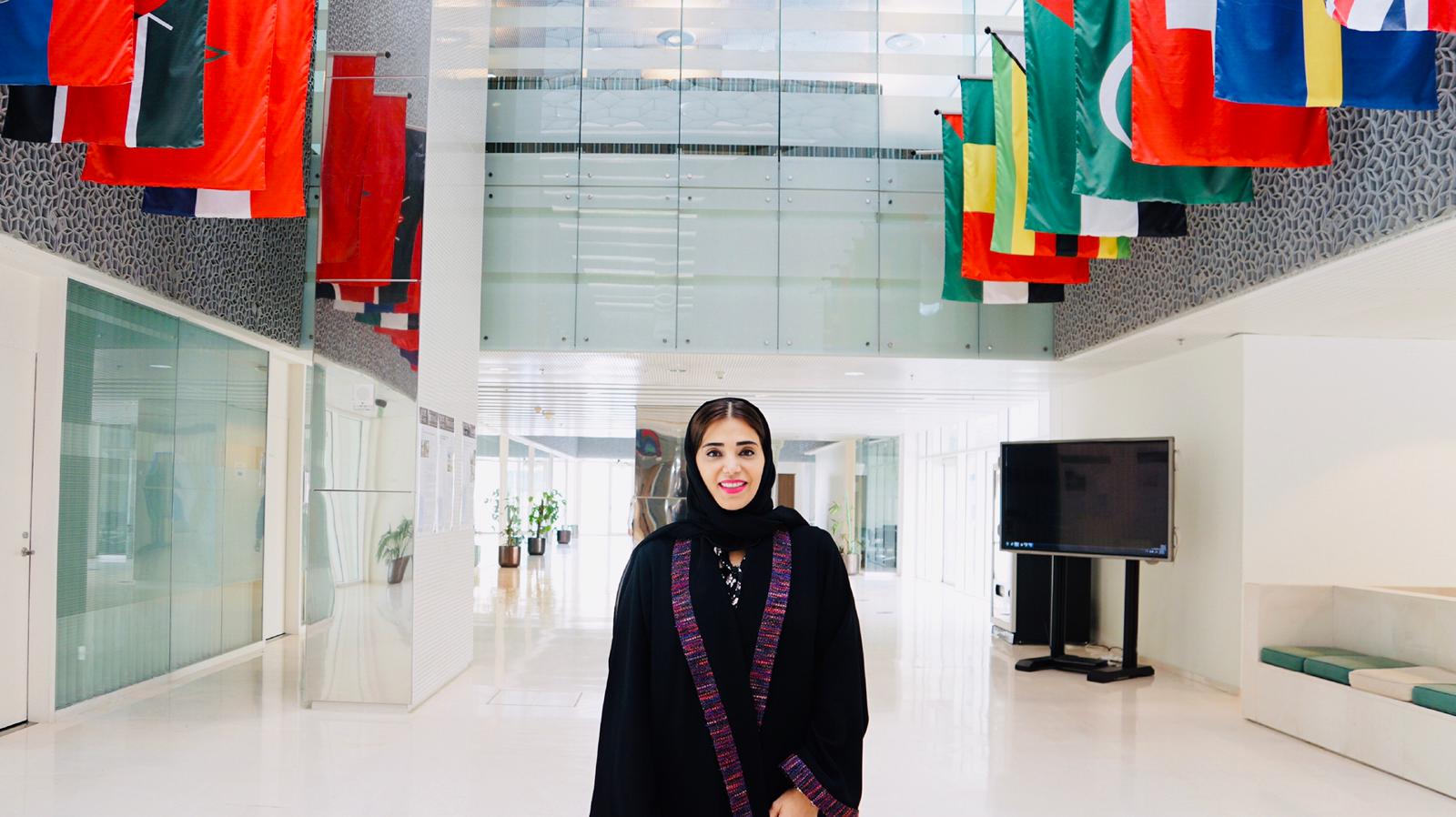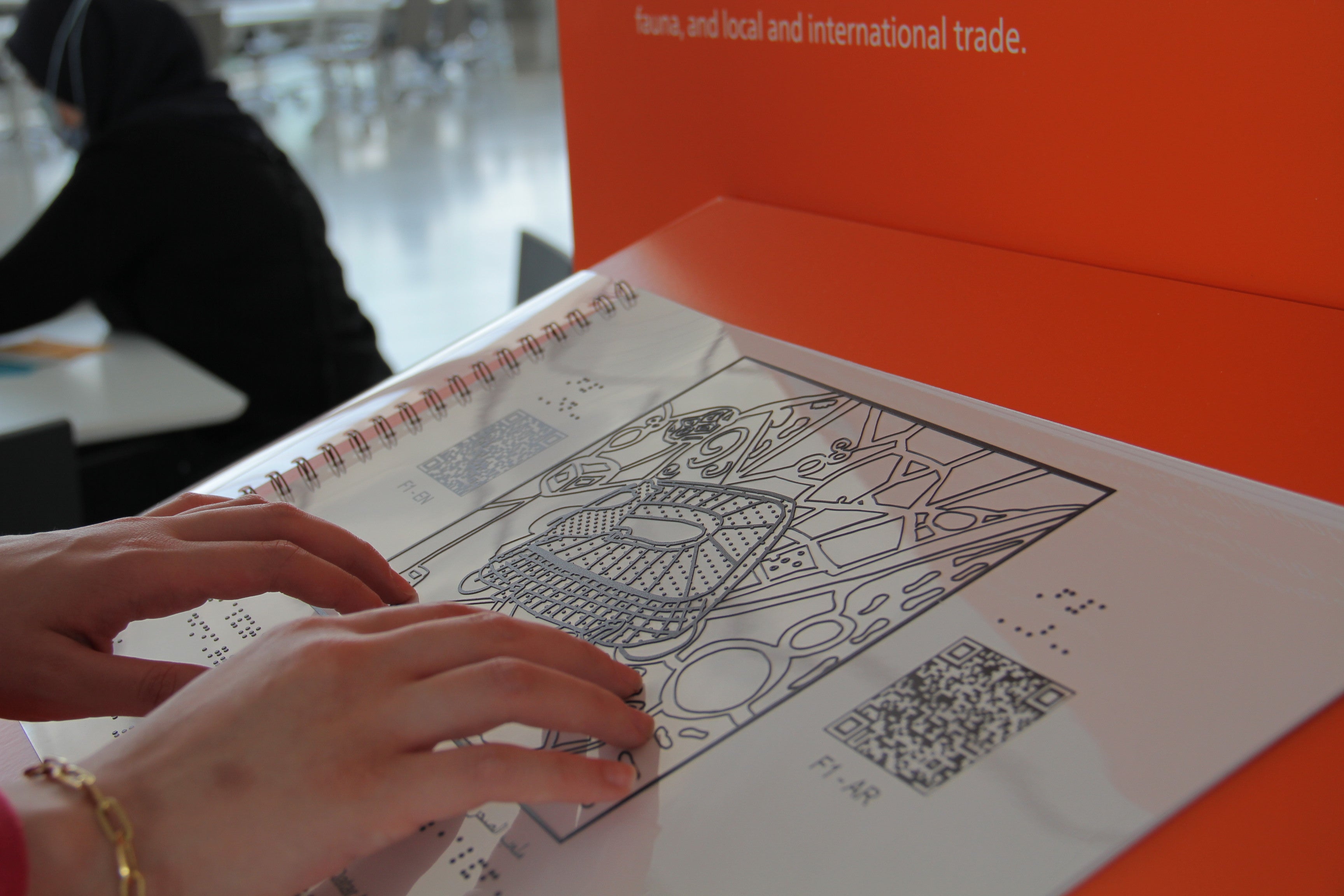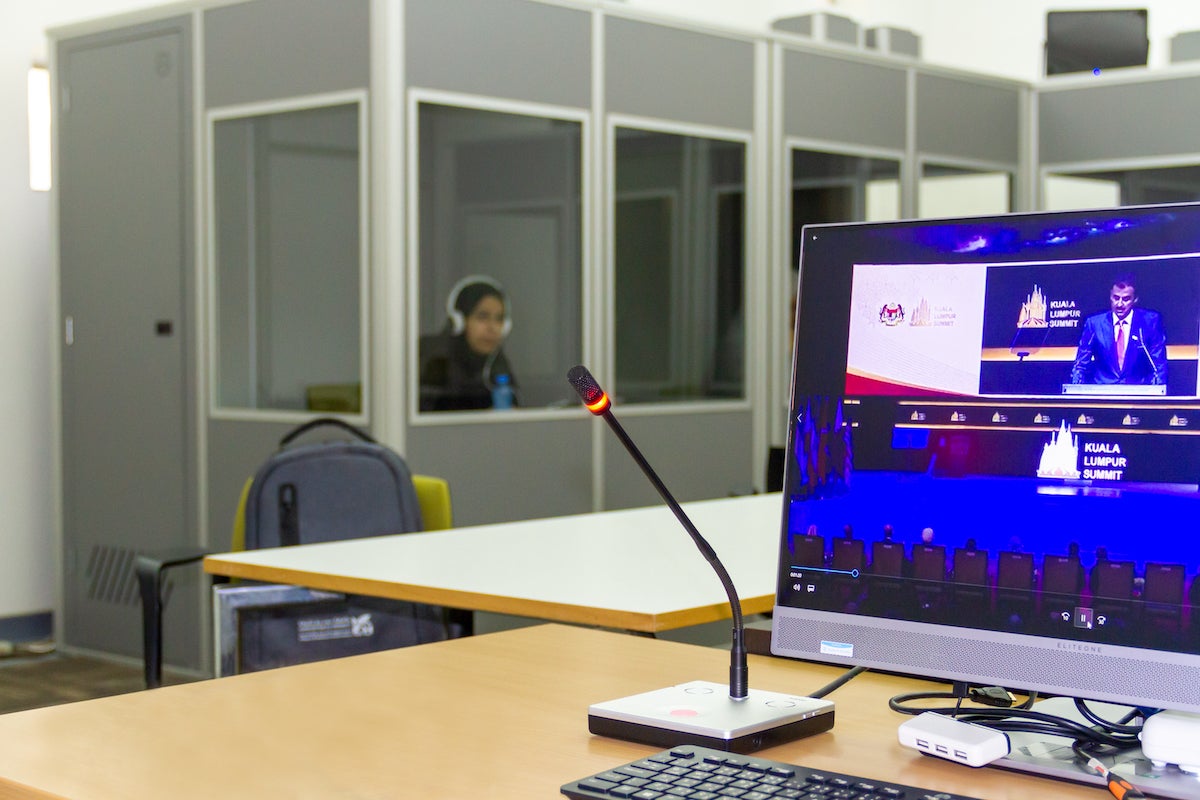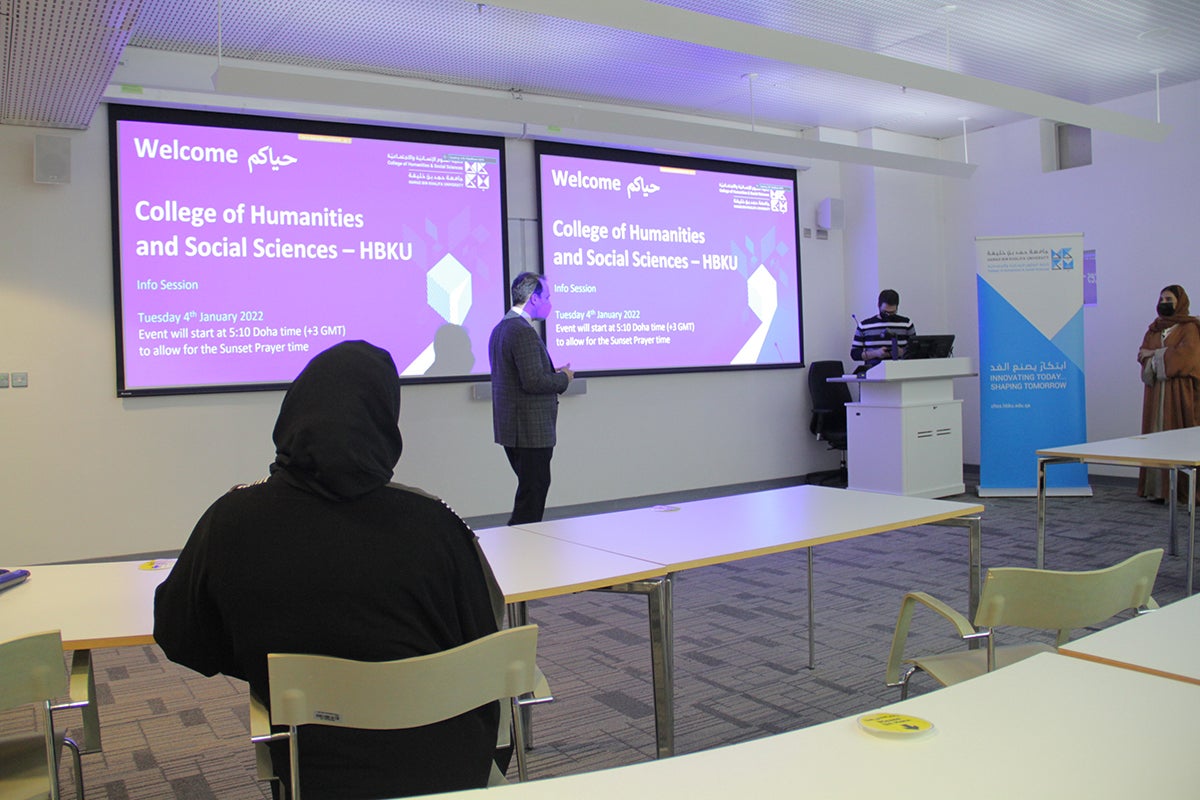
College of Humanities and Social Sciences Holds Launch for 'The Routledge Handbook on the Middle East Economy'
CHSS professor and several contributors discuss regional economic challenges and policy responses needed

The College of Humanities and Social Sciences (CHSS) at Hamad Bin Khalifa University (HBKU) convened a panel of international experts to discuss key topics from 'The Routledge Handbook on the Middle East Economy', edited by Dr. Hassan Hakimian, Professor of Economics and Director of the Middle Eastern Studies Department at CHSS.
Held on November 4, the webinar focused on the first handbook of its type on Middle Eastern economies. It captured the salient features of these economies and critically examined the public policy responses needed to address their challenges and opportunities. The book offers a comprehensive understanding of the region’s main economic issues, through 22 chapters, organized into six thematic sections.
The lively discussion on its pertinent themes was moderated by Dr. Hannah Bargawi, Senior Lecturer in Economics and Co-Head of the Department of Economics, SOAS University of London. The selected panel of speakers reflected the book’s wide-ranging perspectives from renowned subject specialists.
Dr. Hakimian was joined by Dr. Khalid Abu-Ismail, Chief of the Economic Development and Poverty Section at the United Nations Economic and Social Commission for West Asia (ESCWA), Beirut; Dr. Raimundo Soto, Associate Professor of Economics, Pontificia Universidad Católica de Chile; Dr. Safaa El Tayeb El-Kogali, Education Manager for East and Southern Africa at the World Bank; and Dr. Caroline Krafft, Associate Professor in the Department of Economics and Political Science, St. Catherine University, Minnesota. Combining a discussion of theory and empirical evidence, the launch highlighted the book’s major contributions. In his opening presentation, Dr. Hakimian focused on the evolution of Middle East economics as a field within applied development economics to set the context for other speakers’ presentations.
Dr. Hakimian said after the launch: “In this emergent academic field, this book fills an important gap and we hope it will become a key resource for scholars of Middle East economics and development studies. We express our appreciation to all contributors to the handbook and especially to our panel of speakers for sharing their insights based on the extensive research that went into the book. By providing an overview of some of the principal economic problems, policies and performances of countries in the region, the authors have highlighted why collaborative research initiatives of this type can play such an important role.”
More information on 'The Routledge Handbook on the Middle East Economy' is available at www.routledge.com.
Related News

HBKU’s College of Humanities and Social Sciences Graduates Shaping Society and Advancing Knowledge
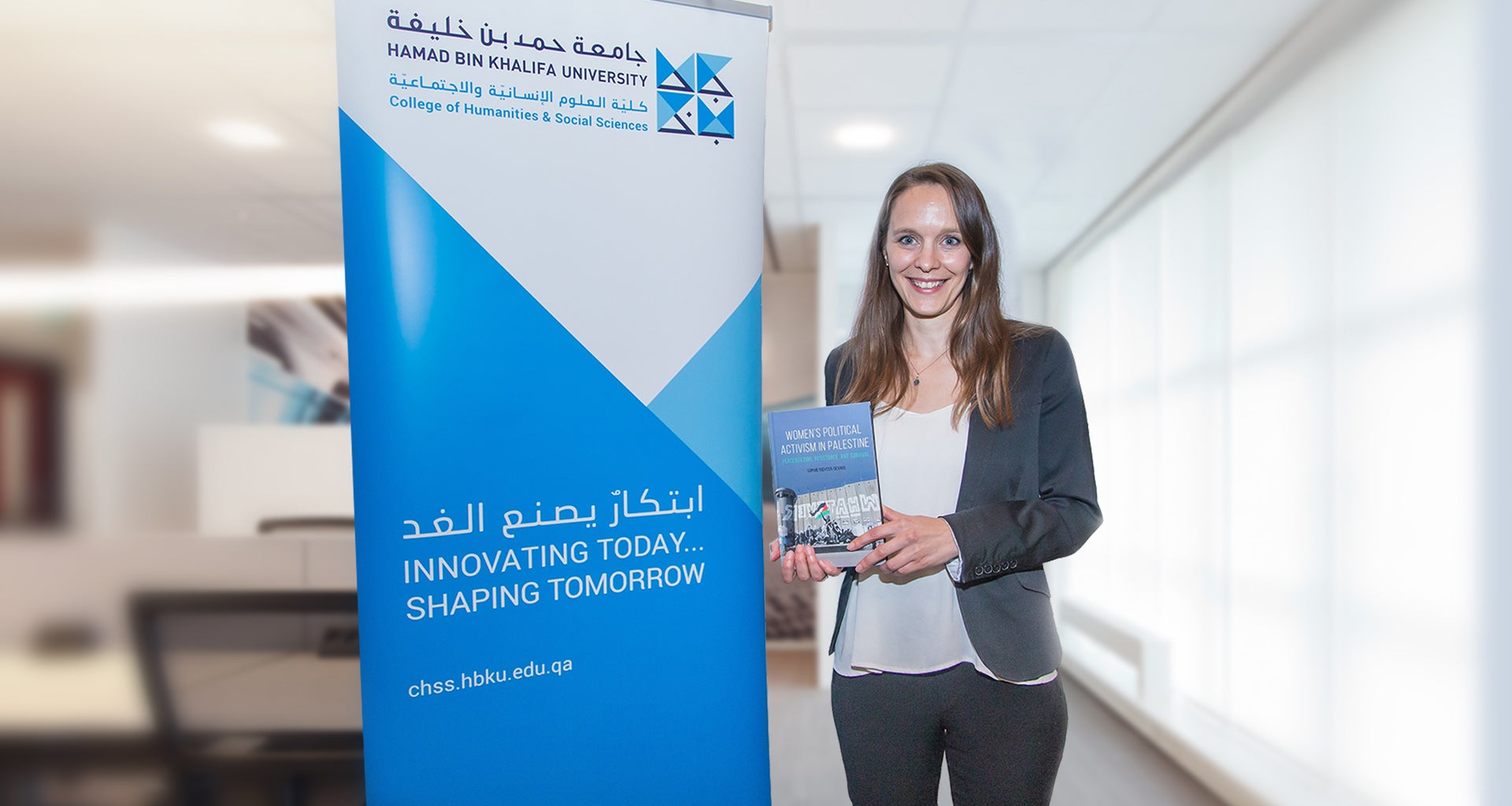
HBKU’s College of Humanities and Social Sciences Professor Discusses Topics on Women in Palestine

HBKU’s Translation and Interpreting Institute Acts as a Catalyst for Disability-Inclusive Change in Wider Society
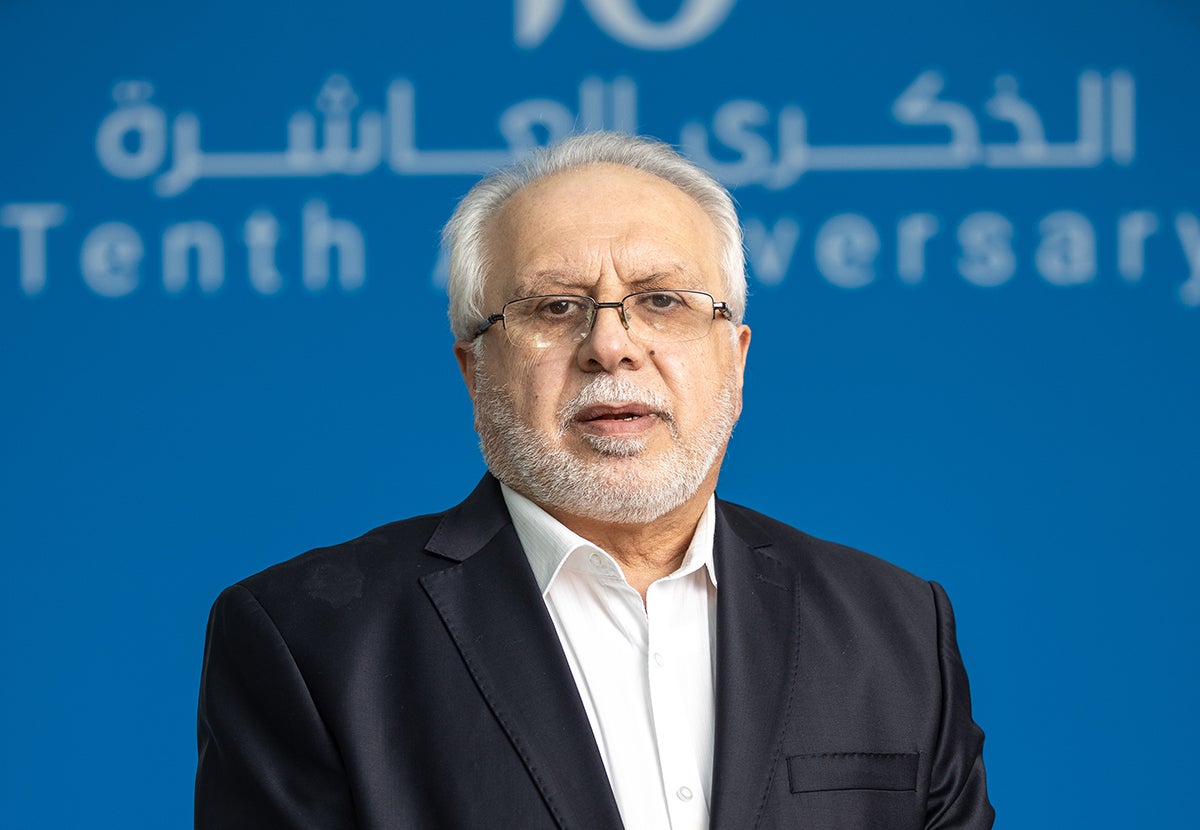
Interview with Mr. Mowafak Tawfeek, Graduate, College of Humanities and Social Sciences, First Batch of HBKU Graduates
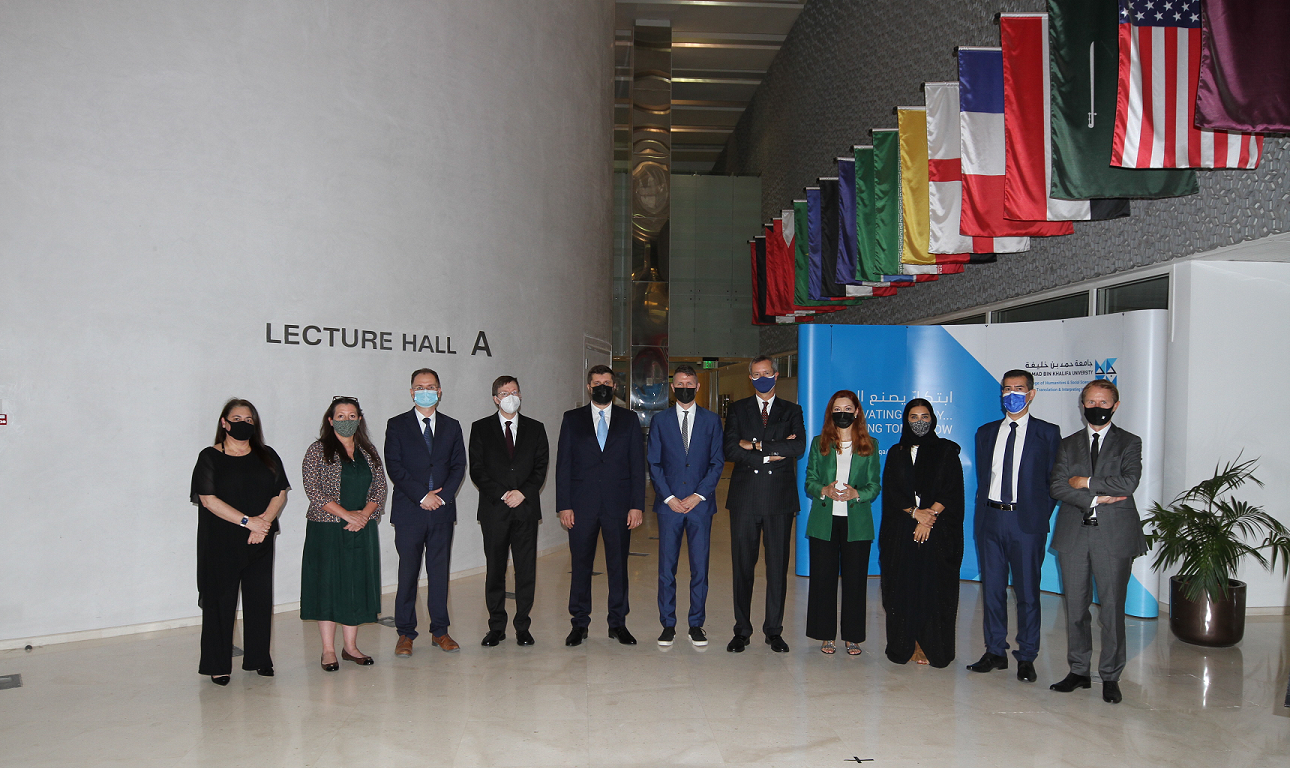
HBKU’s Translation and Interpreting Institute Celebrates Linguistic and Cultural Diversity on the European Day of Languages

HBKU Audiovisual Translation Graduate Students Contribute to Autism Resources in the Arabic Language

College of Humanities and Social Sciences Celebrates Role of Women Engineers During the Pandemic

Why Language Matters: Encouraging Cultural Exchange Through TII’s Mandarin Chinese Program

HBKU’s College of Humanities and Social Sciences Graduates Shaping Society and Advancing Knowledge

HBKU’s College of Humanities and Social Sciences Professor Discusses Topics on Women in Palestine

HBKU’s Translation and Interpreting Institute Acts as a Catalyst for Disability-Inclusive Change in Wider Society

Interview with Mr. Mowafak Tawfeek, Graduate, College of Humanities and Social Sciences, First Batch of HBKU Graduates

HBKU’s Translation and Interpreting Institute Celebrates Linguistic and Cultural Diversity on the European Day of Languages

HBKU Audiovisual Translation Graduate Students Contribute to Autism Resources in the Arabic Language

College of Humanities and Social Sciences Celebrates Role of Women Engineers During the Pandemic

Why Language Matters: Encouraging Cultural Exchange Through TII’s Mandarin Chinese Program

HBKU’s College of Humanities and Social Sciences Graduates Shaping Society and Advancing Knowledge

HBKU’s College of Humanities and Social Sciences Professor Discusses Topics on Women in Palestine

HBKU’s Translation and Interpreting Institute Acts as a Catalyst for Disability-Inclusive Change in Wider Society

Interview with Mr. Mowafak Tawfeek, Graduate, College of Humanities and Social Sciences, First Batch of HBKU Graduates

HBKU’s Translation and Interpreting Institute Celebrates Linguistic and Cultural Diversity on the European Day of Languages

HBKU Audiovisual Translation Graduate Students Contribute to Autism Resources in the Arabic Language

College of Humanities and Social Sciences Celebrates Role of Women Engineers During the Pandemic

Why Language Matters: Encouraging Cultural Exchange Through TII’s Mandarin Chinese Program

HBKU’s College of Humanities and Social Sciences Graduates Shaping Society and Advancing Knowledge

HBKU’s College of Humanities and Social Sciences Professor Discusses Topics on Women in Palestine

HBKU’s Translation and Interpreting Institute Acts as a Catalyst for Disability-Inclusive Change in Wider Society

Interview with Mr. Mowafak Tawfeek, Graduate, College of Humanities and Social Sciences, First Batch of HBKU Graduates

HBKU’s Translation and Interpreting Institute Celebrates Linguistic and Cultural Diversity on the European Day of Languages

HBKU Audiovisual Translation Graduate Students Contribute to Autism Resources in the Arabic Language

College of Humanities and Social Sciences Celebrates Role of Women Engineers During the Pandemic

Why Language Matters: Encouraging Cultural Exchange Through TII’s Mandarin Chinese Program

HBKU’s College of Humanities and Social Sciences Graduates Shaping Society and Advancing Knowledge

HBKU’s College of Humanities and Social Sciences Professor Discusses Topics on Women in Palestine

HBKU’s Translation and Interpreting Institute Acts as a Catalyst for Disability-Inclusive Change in Wider Society

Interview with Mr. Mowafak Tawfeek, Graduate, College of Humanities and Social Sciences, First Batch of HBKU Graduates

HBKU’s Translation and Interpreting Institute Celebrates Linguistic and Cultural Diversity on the European Day of Languages

HBKU Audiovisual Translation Graduate Students Contribute to Autism Resources in the Arabic Language

College of Humanities and Social Sciences Celebrates Role of Women Engineers During the Pandemic

Why Language Matters: Encouraging Cultural Exchange Through TII’s Mandarin Chinese Program

HBKU’s College of Humanities and Social Sciences Graduates Shaping Society and Advancing Knowledge

HBKU’s College of Humanities and Social Sciences Professor Discusses Topics on Women in Palestine

HBKU’s Translation and Interpreting Institute Acts as a Catalyst for Disability-Inclusive Change in Wider Society

Interview with Mr. Mowafak Tawfeek, Graduate, College of Humanities and Social Sciences, First Batch of HBKU Graduates

HBKU’s Translation and Interpreting Institute Celebrates Linguistic and Cultural Diversity on the European Day of Languages

HBKU Audiovisual Translation Graduate Students Contribute to Autism Resources in the Arabic Language

College of Humanities and Social Sciences Celebrates Role of Women Engineers During the Pandemic

Why Language Matters: Encouraging Cultural Exchange Through TII’s Mandarin Chinese Program

HBKU’s College of Humanities and Social Sciences Graduates Shaping Society and Advancing Knowledge

HBKU’s College of Humanities and Social Sciences Professor Discusses Topics on Women in Palestine

HBKU’s Translation and Interpreting Institute Acts as a Catalyst for Disability-Inclusive Change in Wider Society

Interview with Mr. Mowafak Tawfeek, Graduate, College of Humanities and Social Sciences, First Batch of HBKU Graduates

HBKU’s Translation and Interpreting Institute Celebrates Linguistic and Cultural Diversity on the European Day of Languages

HBKU Audiovisual Translation Graduate Students Contribute to Autism Resources in the Arabic Language

College of Humanities and Social Sciences Celebrates Role of Women Engineers During the Pandemic

Why Language Matters: Encouraging Cultural Exchange Through TII’s Mandarin Chinese Program

HBKU’s College of Humanities and Social Sciences Graduates Shaping Society and Advancing Knowledge

HBKU’s College of Humanities and Social Sciences Professor Discusses Topics on Women in Palestine

HBKU’s Translation and Interpreting Institute Acts as a Catalyst for Disability-Inclusive Change in Wider Society

Interview with Mr. Mowafak Tawfeek, Graduate, College of Humanities and Social Sciences, First Batch of HBKU Graduates

HBKU’s Translation and Interpreting Institute Celebrates Linguistic and Cultural Diversity on the European Day of Languages

HBKU Audiovisual Translation Graduate Students Contribute to Autism Resources in the Arabic Language

College of Humanities and Social Sciences Celebrates Role of Women Engineers During the Pandemic

Why Language Matters: Encouraging Cultural Exchange Through TII’s Mandarin Chinese Program

HBKU’s College of Humanities and Social Sciences Graduates Shaping Society and Advancing Knowledge

HBKU’s College of Humanities and Social Sciences Professor Discusses Topics on Women in Palestine

HBKU’s Translation and Interpreting Institute Acts as a Catalyst for Disability-Inclusive Change in Wider Society

Interview with Mr. Mowafak Tawfeek, Graduate, College of Humanities and Social Sciences, First Batch of HBKU Graduates

HBKU’s Translation and Interpreting Institute Celebrates Linguistic and Cultural Diversity on the European Day of Languages

HBKU Audiovisual Translation Graduate Students Contribute to Autism Resources in the Arabic Language

College of Humanities and Social Sciences Celebrates Role of Women Engineers During the Pandemic

Why Language Matters: Encouraging Cultural Exchange Through TII’s Mandarin Chinese Program

HBKU’s College of Humanities and Social Sciences Graduates Shaping Society and Advancing Knowledge

HBKU’s College of Humanities and Social Sciences Professor Discusses Topics on Women in Palestine

HBKU’s Translation and Interpreting Institute Acts as a Catalyst for Disability-Inclusive Change in Wider Society

Interview with Mr. Mowafak Tawfeek, Graduate, College of Humanities and Social Sciences, First Batch of HBKU Graduates

HBKU’s Translation and Interpreting Institute Celebrates Linguistic and Cultural Diversity on the European Day of Languages

HBKU Audiovisual Translation Graduate Students Contribute to Autism Resources in the Arabic Language

College of Humanities and Social Sciences Celebrates Role of Women Engineers During the Pandemic

Why Language Matters: Encouraging Cultural Exchange Through TII’s Mandarin Chinese Program

HBKU’s College of Humanities and Social Sciences Graduates Shaping Society and Advancing Knowledge

HBKU’s College of Humanities and Social Sciences Professor Discusses Topics on Women in Palestine

HBKU’s Translation and Interpreting Institute Acts as a Catalyst for Disability-Inclusive Change in Wider Society

Interview with Mr. Mowafak Tawfeek, Graduate, College of Humanities and Social Sciences, First Batch of HBKU Graduates

HBKU’s Translation and Interpreting Institute Celebrates Linguistic and Cultural Diversity on the European Day of Languages

HBKU Audiovisual Translation Graduate Students Contribute to Autism Resources in the Arabic Language

College of Humanities and Social Sciences Celebrates Role of Women Engineers During the Pandemic

Why Language Matters: Encouraging Cultural Exchange Through TII’s Mandarin Chinese Program

HBKU’s College of Humanities and Social Sciences Graduates Shaping Society and Advancing Knowledge

HBKU’s College of Humanities and Social Sciences Professor Discusses Topics on Women in Palestine

HBKU’s Translation and Interpreting Institute Acts as a Catalyst for Disability-Inclusive Change in Wider Society

Interview with Mr. Mowafak Tawfeek, Graduate, College of Humanities and Social Sciences, First Batch of HBKU Graduates

HBKU’s Translation and Interpreting Institute Celebrates Linguistic and Cultural Diversity on the European Day of Languages

HBKU Audiovisual Translation Graduate Students Contribute to Autism Resources in the Arabic Language

College of Humanities and Social Sciences Celebrates Role of Women Engineers During the Pandemic

Why Language Matters: Encouraging Cultural Exchange Through TII’s Mandarin Chinese Program

HBKU’s College of Humanities and Social Sciences Graduates Shaping Society and Advancing Knowledge

HBKU’s College of Humanities and Social Sciences Professor Discusses Topics on Women in Palestine

HBKU’s Translation and Interpreting Institute Acts as a Catalyst for Disability-Inclusive Change in Wider Society

Interview with Mr. Mowafak Tawfeek, Graduate, College of Humanities and Social Sciences, First Batch of HBKU Graduates

HBKU’s Translation and Interpreting Institute Celebrates Linguistic and Cultural Diversity on the European Day of Languages

HBKU Audiovisual Translation Graduate Students Contribute to Autism Resources in the Arabic Language

College of Humanities and Social Sciences Celebrates Role of Women Engineers During the Pandemic

Why Language Matters: Encouraging Cultural Exchange Through TII’s Mandarin Chinese Program

HBKU’s College of Humanities and Social Sciences Graduates Shaping Society and Advancing Knowledge

HBKU’s College of Humanities and Social Sciences Professor Discusses Topics on Women in Palestine

HBKU’s Translation and Interpreting Institute Acts as a Catalyst for Disability-Inclusive Change in Wider Society

Interview with Mr. Mowafak Tawfeek, Graduate, College of Humanities and Social Sciences, First Batch of HBKU Graduates

HBKU’s Translation and Interpreting Institute Celebrates Linguistic and Cultural Diversity on the European Day of Languages

HBKU Audiovisual Translation Graduate Students Contribute to Autism Resources in the Arabic Language

College of Humanities and Social Sciences Celebrates Role of Women Engineers During the Pandemic

Why Language Matters: Encouraging Cultural Exchange Through TII’s Mandarin Chinese Program

HBKU’s College of Humanities and Social Sciences Graduates Shaping Society and Advancing Knowledge

HBKU’s College of Humanities and Social Sciences Professor Discusses Topics on Women in Palestine

HBKU’s Translation and Interpreting Institute Acts as a Catalyst for Disability-Inclusive Change in Wider Society

Interview with Mr. Mowafak Tawfeek, Graduate, College of Humanities and Social Sciences, First Batch of HBKU Graduates

HBKU’s Translation and Interpreting Institute Celebrates Linguistic and Cultural Diversity on the European Day of Languages

HBKU Audiovisual Translation Graduate Students Contribute to Autism Resources in the Arabic Language

College of Humanities and Social Sciences Celebrates Role of Women Engineers During the Pandemic

Why Language Matters: Encouraging Cultural Exchange Through TII’s Mandarin Chinese Program

HBKU’s College of Humanities and Social Sciences Graduates Shaping Society and Advancing Knowledge

HBKU’s College of Humanities and Social Sciences Professor Discusses Topics on Women in Palestine

HBKU’s Translation and Interpreting Institute Acts as a Catalyst for Disability-Inclusive Change in Wider Society

Interview with Mr. Mowafak Tawfeek, Graduate, College of Humanities and Social Sciences, First Batch of HBKU Graduates

HBKU’s Translation and Interpreting Institute Celebrates Linguistic and Cultural Diversity on the European Day of Languages

HBKU Audiovisual Translation Graduate Students Contribute to Autism Resources in the Arabic Language

College of Humanities and Social Sciences Celebrates Role of Women Engineers During the Pandemic

Why Language Matters: Encouraging Cultural Exchange Through TII’s Mandarin Chinese Program

HBKU’s College of Humanities and Social Sciences Graduates Shaping Society and Advancing Knowledge

HBKU’s College of Humanities and Social Sciences Professor Discusses Topics on Women in Palestine

HBKU’s Translation and Interpreting Institute Acts as a Catalyst for Disability-Inclusive Change in Wider Society

Interview with Mr. Mowafak Tawfeek, Graduate, College of Humanities and Social Sciences, First Batch of HBKU Graduates

HBKU’s Translation and Interpreting Institute Celebrates Linguistic and Cultural Diversity on the European Day of Languages

HBKU Audiovisual Translation Graduate Students Contribute to Autism Resources in the Arabic Language

College of Humanities and Social Sciences Celebrates Role of Women Engineers During the Pandemic

Why Language Matters: Encouraging Cultural Exchange Through TII’s Mandarin Chinese Program

HBKU’s College of Humanities and Social Sciences Graduates Shaping Society and Advancing Knowledge

HBKU’s College of Humanities and Social Sciences Professor Discusses Topics on Women in Palestine

HBKU’s Translation and Interpreting Institute Acts as a Catalyst for Disability-Inclusive Change in Wider Society

Interview with Mr. Mowafak Tawfeek, Graduate, College of Humanities and Social Sciences, First Batch of HBKU Graduates

HBKU’s Translation and Interpreting Institute Celebrates Linguistic and Cultural Diversity on the European Day of Languages

HBKU Audiovisual Translation Graduate Students Contribute to Autism Resources in the Arabic Language

College of Humanities and Social Sciences Celebrates Role of Women Engineers During the Pandemic

Why Language Matters: Encouraging Cultural Exchange Through TII’s Mandarin Chinese Program

HBKU’s College of Humanities and Social Sciences Graduates Shaping Society and Advancing Knowledge

HBKU’s College of Humanities and Social Sciences Professor Discusses Topics on Women in Palestine

HBKU’s Translation and Interpreting Institute Acts as a Catalyst for Disability-Inclusive Change in Wider Society

Interview with Mr. Mowafak Tawfeek, Graduate, College of Humanities and Social Sciences, First Batch of HBKU Graduates

HBKU’s Translation and Interpreting Institute Celebrates Linguistic and Cultural Diversity on the European Day of Languages

HBKU Audiovisual Translation Graduate Students Contribute to Autism Resources in the Arabic Language

College of Humanities and Social Sciences Celebrates Role of Women Engineers During the Pandemic

Why Language Matters: Encouraging Cultural Exchange Through TII’s Mandarin Chinese Program

HBKU’s College of Humanities and Social Sciences Graduates Shaping Society and Advancing Knowledge

HBKU’s College of Humanities and Social Sciences Professor Discusses Topics on Women in Palestine

HBKU’s Translation and Interpreting Institute Acts as a Catalyst for Disability-Inclusive Change in Wider Society

Interview with Mr. Mowafak Tawfeek, Graduate, College of Humanities and Social Sciences, First Batch of HBKU Graduates

HBKU’s Translation and Interpreting Institute Celebrates Linguistic and Cultural Diversity on the European Day of Languages

HBKU Audiovisual Translation Graduate Students Contribute to Autism Resources in the Arabic Language

College of Humanities and Social Sciences Celebrates Role of Women Engineers During the Pandemic

Why Language Matters: Encouraging Cultural Exchange Through TII’s Mandarin Chinese Program

HBKU’s College of Humanities and Social Sciences Graduates Shaping Society and Advancing Knowledge

HBKU’s College of Humanities and Social Sciences Professor Discusses Topics on Women in Palestine

HBKU’s Translation and Interpreting Institute Acts as a Catalyst for Disability-Inclusive Change in Wider Society

Interview with Mr. Mowafak Tawfeek, Graduate, College of Humanities and Social Sciences, First Batch of HBKU Graduates

HBKU’s Translation and Interpreting Institute Celebrates Linguistic and Cultural Diversity on the European Day of Languages

HBKU Audiovisual Translation Graduate Students Contribute to Autism Resources in the Arabic Language

College of Humanities and Social Sciences Celebrates Role of Women Engineers During the Pandemic

Why Language Matters: Encouraging Cultural Exchange Through TII’s Mandarin Chinese Program

HBKU’s College of Humanities and Social Sciences Graduates Shaping Society and Advancing Knowledge

HBKU’s College of Humanities and Social Sciences Professor Discusses Topics on Women in Palestine

HBKU’s Translation and Interpreting Institute Acts as a Catalyst for Disability-Inclusive Change in Wider Society

Interview with Mr. Mowafak Tawfeek, Graduate, College of Humanities and Social Sciences, First Batch of HBKU Graduates

HBKU’s Translation and Interpreting Institute Celebrates Linguistic and Cultural Diversity on the European Day of Languages

HBKU Audiovisual Translation Graduate Students Contribute to Autism Resources in the Arabic Language

College of Humanities and Social Sciences Celebrates Role of Women Engineers During the Pandemic

Why Language Matters: Encouraging Cultural Exchange Through TII’s Mandarin Chinese Program

HBKU’s College of Humanities and Social Sciences Graduates Shaping Society and Advancing Knowledge

HBKU’s College of Humanities and Social Sciences Professor Discusses Topics on Women in Palestine

HBKU’s Translation and Interpreting Institute Acts as a Catalyst for Disability-Inclusive Change in Wider Society

Interview with Mr. Mowafak Tawfeek, Graduate, College of Humanities and Social Sciences, First Batch of HBKU Graduates

HBKU’s Translation and Interpreting Institute Celebrates Linguistic and Cultural Diversity on the European Day of Languages

HBKU Audiovisual Translation Graduate Students Contribute to Autism Resources in the Arabic Language

College of Humanities and Social Sciences Celebrates Role of Women Engineers During the Pandemic

Why Language Matters: Encouraging Cultural Exchange Through TII’s Mandarin Chinese Program

HBKU’s College of Humanities and Social Sciences Graduates Shaping Society and Advancing Knowledge

HBKU’s College of Humanities and Social Sciences Professor Discusses Topics on Women in Palestine

HBKU’s Translation and Interpreting Institute Acts as a Catalyst for Disability-Inclusive Change in Wider Society

Interview with Mr. Mowafak Tawfeek, Graduate, College of Humanities and Social Sciences, First Batch of HBKU Graduates

HBKU’s Translation and Interpreting Institute Celebrates Linguistic and Cultural Diversity on the European Day of Languages

HBKU Audiovisual Translation Graduate Students Contribute to Autism Resources in the Arabic Language

College of Humanities and Social Sciences Celebrates Role of Women Engineers During the Pandemic

Why Language Matters: Encouraging Cultural Exchange Through TII’s Mandarin Chinese Program

HBKU’s College of Humanities and Social Sciences Graduates Shaping Society and Advancing Knowledge

HBKU’s College of Humanities and Social Sciences Professor Discusses Topics on Women in Palestine

HBKU’s Translation and Interpreting Institute Acts as a Catalyst for Disability-Inclusive Change in Wider Society

Interview with Mr. Mowafak Tawfeek, Graduate, College of Humanities and Social Sciences, First Batch of HBKU Graduates

HBKU’s Translation and Interpreting Institute Celebrates Linguistic and Cultural Diversity on the European Day of Languages

HBKU Audiovisual Translation Graduate Students Contribute to Autism Resources in the Arabic Language

College of Humanities and Social Sciences Celebrates Role of Women Engineers During the Pandemic

Why Language Matters: Encouraging Cultural Exchange Through TII’s Mandarin Chinese Program

HBKU’s College of Humanities and Social Sciences Graduates Shaping Society and Advancing Knowledge

HBKU’s College of Humanities and Social Sciences Professor Discusses Topics on Women in Palestine

HBKU’s Translation and Interpreting Institute Acts as a Catalyst for Disability-Inclusive Change in Wider Society

Interview with Mr. Mowafak Tawfeek, Graduate, College of Humanities and Social Sciences, First Batch of HBKU Graduates

HBKU’s Translation and Interpreting Institute Celebrates Linguistic and Cultural Diversity on the European Day of Languages

HBKU Audiovisual Translation Graduate Students Contribute to Autism Resources in the Arabic Language

College of Humanities and Social Sciences Celebrates Role of Women Engineers During the Pandemic

Why Language Matters: Encouraging Cultural Exchange Through TII’s Mandarin Chinese Program

HBKU’s College of Humanities and Social Sciences Graduates Shaping Society and Advancing Knowledge

HBKU’s College of Humanities and Social Sciences Professor Discusses Topics on Women in Palestine

HBKU’s Translation and Interpreting Institute Acts as a Catalyst for Disability-Inclusive Change in Wider Society

Interview with Mr. Mowafak Tawfeek, Graduate, College of Humanities and Social Sciences, First Batch of HBKU Graduates

HBKU’s Translation and Interpreting Institute Celebrates Linguistic and Cultural Diversity on the European Day of Languages

HBKU Audiovisual Translation Graduate Students Contribute to Autism Resources in the Arabic Language

College of Humanities and Social Sciences Celebrates Role of Women Engineers During the Pandemic

Why Language Matters: Encouraging Cultural Exchange Through TII’s Mandarin Chinese Program

HBKU’s College of Humanities and Social Sciences Graduates Shaping Society and Advancing Knowledge

HBKU’s College of Humanities and Social Sciences Professor Discusses Topics on Women in Palestine

HBKU’s Translation and Interpreting Institute Acts as a Catalyst for Disability-Inclusive Change in Wider Society

Interview with Mr. Mowafak Tawfeek, Graduate, College of Humanities and Social Sciences, First Batch of HBKU Graduates

HBKU’s Translation and Interpreting Institute Celebrates Linguistic and Cultural Diversity on the European Day of Languages

HBKU Audiovisual Translation Graduate Students Contribute to Autism Resources in the Arabic Language

College of Humanities and Social Sciences Celebrates Role of Women Engineers During the Pandemic

Why Language Matters: Encouraging Cultural Exchange Through TII’s Mandarin Chinese Program

HBKU’s College of Humanities and Social Sciences Graduates Shaping Society and Advancing Knowledge

HBKU’s College of Humanities and Social Sciences Professor Discusses Topics on Women in Palestine

HBKU’s Translation and Interpreting Institute Acts as a Catalyst for Disability-Inclusive Change in Wider Society

Interview with Mr. Mowafak Tawfeek, Graduate, College of Humanities and Social Sciences, First Batch of HBKU Graduates

HBKU’s Translation and Interpreting Institute Celebrates Linguistic and Cultural Diversity on the European Day of Languages

HBKU Audiovisual Translation Graduate Students Contribute to Autism Resources in the Arabic Language

College of Humanities and Social Sciences Celebrates Role of Women Engineers During the Pandemic

Why Language Matters: Encouraging Cultural Exchange Through TII’s Mandarin Chinese Program

HBKU’s College of Humanities and Social Sciences Graduates Shaping Society and Advancing Knowledge

HBKU’s College of Humanities and Social Sciences Professor Discusses Topics on Women in Palestine

HBKU’s Translation and Interpreting Institute Acts as a Catalyst for Disability-Inclusive Change in Wider Society

Interview with Mr. Mowafak Tawfeek, Graduate, College of Humanities and Social Sciences, First Batch of HBKU Graduates

HBKU’s Translation and Interpreting Institute Celebrates Linguistic and Cultural Diversity on the European Day of Languages

HBKU Audiovisual Translation Graduate Students Contribute to Autism Resources in the Arabic Language

College of Humanities and Social Sciences Celebrates Role of Women Engineers During the Pandemic

Why Language Matters: Encouraging Cultural Exchange Through TII’s Mandarin Chinese Program

HBKU’s College of Humanities and Social Sciences Graduates Shaping Society and Advancing Knowledge

HBKU’s College of Humanities and Social Sciences Professor Discusses Topics on Women in Palestine

HBKU’s Translation and Interpreting Institute Acts as a Catalyst for Disability-Inclusive Change in Wider Society

Interview with Mr. Mowafak Tawfeek, Graduate, College of Humanities and Social Sciences, First Batch of HBKU Graduates

HBKU’s Translation and Interpreting Institute Celebrates Linguistic and Cultural Diversity on the European Day of Languages

HBKU Audiovisual Translation Graduate Students Contribute to Autism Resources in the Arabic Language

College of Humanities and Social Sciences Celebrates Role of Women Engineers During the Pandemic

Why Language Matters: Encouraging Cultural Exchange Through TII’s Mandarin Chinese Program

HBKU’s College of Humanities and Social Sciences Graduates Shaping Society and Advancing Knowledge

HBKU’s College of Humanities and Social Sciences Professor Discusses Topics on Women in Palestine

HBKU’s Translation and Interpreting Institute Acts as a Catalyst for Disability-Inclusive Change in Wider Society

Interview with Mr. Mowafak Tawfeek, Graduate, College of Humanities and Social Sciences, First Batch of HBKU Graduates

HBKU’s Translation and Interpreting Institute Celebrates Linguistic and Cultural Diversity on the European Day of Languages

HBKU Audiovisual Translation Graduate Students Contribute to Autism Resources in the Arabic Language

College of Humanities and Social Sciences Celebrates Role of Women Engineers During the Pandemic

Why Language Matters: Encouraging Cultural Exchange Through TII’s Mandarin Chinese Program

HBKU’s College of Humanities and Social Sciences Graduates Shaping Society and Advancing Knowledge

HBKU’s College of Humanities and Social Sciences Professor Discusses Topics on Women in Palestine

HBKU’s Translation and Interpreting Institute Acts as a Catalyst for Disability-Inclusive Change in Wider Society

Interview with Mr. Mowafak Tawfeek, Graduate, College of Humanities and Social Sciences, First Batch of HBKU Graduates

HBKU’s Translation and Interpreting Institute Celebrates Linguistic and Cultural Diversity on the European Day of Languages

HBKU Audiovisual Translation Graduate Students Contribute to Autism Resources in the Arabic Language

College of Humanities and Social Sciences Celebrates Role of Women Engineers During the Pandemic

Why Language Matters: Encouraging Cultural Exchange Through TII’s Mandarin Chinese Program

HBKU’s College of Humanities and Social Sciences Graduates Shaping Society and Advancing Knowledge

HBKU’s College of Humanities and Social Sciences Professor Discusses Topics on Women in Palestine

HBKU’s Translation and Interpreting Institute Acts as a Catalyst for Disability-Inclusive Change in Wider Society

Interview with Mr. Mowafak Tawfeek, Graduate, College of Humanities and Social Sciences, First Batch of HBKU Graduates

HBKU’s Translation and Interpreting Institute Celebrates Linguistic and Cultural Diversity on the European Day of Languages

HBKU Audiovisual Translation Graduate Students Contribute to Autism Resources in the Arabic Language

College of Humanities and Social Sciences Celebrates Role of Women Engineers During the Pandemic

Why Language Matters: Encouraging Cultural Exchange Through TII’s Mandarin Chinese Program

HBKU’s College of Humanities and Social Sciences Graduates Shaping Society and Advancing Knowledge

HBKU’s College of Humanities and Social Sciences Professor Discusses Topics on Women in Palestine

HBKU’s Translation and Interpreting Institute Acts as a Catalyst for Disability-Inclusive Change in Wider Society

Interview with Mr. Mowafak Tawfeek, Graduate, College of Humanities and Social Sciences, First Batch of HBKU Graduates

HBKU’s Translation and Interpreting Institute Celebrates Linguistic and Cultural Diversity on the European Day of Languages

HBKU Audiovisual Translation Graduate Students Contribute to Autism Resources in the Arabic Language

College of Humanities and Social Sciences Celebrates Role of Women Engineers During the Pandemic

Why Language Matters: Encouraging Cultural Exchange Through TII’s Mandarin Chinese Program

HBKU’s College of Humanities and Social Sciences Graduates Shaping Society and Advancing Knowledge

HBKU’s College of Humanities and Social Sciences Professor Discusses Topics on Women in Palestine

HBKU’s Translation and Interpreting Institute Acts as a Catalyst for Disability-Inclusive Change in Wider Society

Interview with Mr. Mowafak Tawfeek, Graduate, College of Humanities and Social Sciences, First Batch of HBKU Graduates

HBKU’s Translation and Interpreting Institute Celebrates Linguistic and Cultural Diversity on the European Day of Languages

HBKU Audiovisual Translation Graduate Students Contribute to Autism Resources in the Arabic Language

College of Humanities and Social Sciences Celebrates Role of Women Engineers During the Pandemic

Why Language Matters: Encouraging Cultural Exchange Through TII’s Mandarin Chinese Program

HBKU’s College of Humanities and Social Sciences Graduates Shaping Society and Advancing Knowledge

HBKU’s College of Humanities and Social Sciences Professor Discusses Topics on Women in Palestine

HBKU’s Translation and Interpreting Institute Acts as a Catalyst for Disability-Inclusive Change in Wider Society

Interview with Mr. Mowafak Tawfeek, Graduate, College of Humanities and Social Sciences, First Batch of HBKU Graduates

HBKU’s Translation and Interpreting Institute Celebrates Linguistic and Cultural Diversity on the European Day of Languages

HBKU Audiovisual Translation Graduate Students Contribute to Autism Resources in the Arabic Language

College of Humanities and Social Sciences Celebrates Role of Women Engineers During the Pandemic

Why Language Matters: Encouraging Cultural Exchange Through TII’s Mandarin Chinese Program

HBKU’s College of Humanities and Social Sciences Graduates Shaping Society and Advancing Knowledge

HBKU’s College of Humanities and Social Sciences Professor Discusses Topics on Women in Palestine

HBKU’s Translation and Interpreting Institute Acts as a Catalyst for Disability-Inclusive Change in Wider Society

Interview with Mr. Mowafak Tawfeek, Graduate, College of Humanities and Social Sciences, First Batch of HBKU Graduates

HBKU’s Translation and Interpreting Institute Celebrates Linguistic and Cultural Diversity on the European Day of Languages

HBKU Audiovisual Translation Graduate Students Contribute to Autism Resources in the Arabic Language

College of Humanities and Social Sciences Celebrates Role of Women Engineers During the Pandemic

Why Language Matters: Encouraging Cultural Exchange Through TII’s Mandarin Chinese Program

HBKU’s College of Humanities and Social Sciences Graduates Shaping Society and Advancing Knowledge

HBKU’s College of Humanities and Social Sciences Professor Discusses Topics on Women in Palestine

HBKU’s Translation and Interpreting Institute Acts as a Catalyst for Disability-Inclusive Change in Wider Society

Interview with Mr. Mowafak Tawfeek, Graduate, College of Humanities and Social Sciences, First Batch of HBKU Graduates

HBKU’s Translation and Interpreting Institute Celebrates Linguistic and Cultural Diversity on the European Day of Languages

HBKU Audiovisual Translation Graduate Students Contribute to Autism Resources in the Arabic Language

College of Humanities and Social Sciences Celebrates Role of Women Engineers During the Pandemic

Why Language Matters: Encouraging Cultural Exchange Through TII’s Mandarin Chinese Program

HBKU’s College of Humanities and Social Sciences Graduates Shaping Society and Advancing Knowledge

HBKU’s College of Humanities and Social Sciences Professor Discusses Topics on Women in Palestine

HBKU’s Translation and Interpreting Institute Acts as a Catalyst for Disability-Inclusive Change in Wider Society

Interview with Mr. Mowafak Tawfeek, Graduate, College of Humanities and Social Sciences, First Batch of HBKU Graduates

HBKU’s Translation and Interpreting Institute Celebrates Linguistic and Cultural Diversity on the European Day of Languages

HBKU Audiovisual Translation Graduate Students Contribute to Autism Resources in the Arabic Language

College of Humanities and Social Sciences Celebrates Role of Women Engineers During the Pandemic

Why Language Matters: Encouraging Cultural Exchange Through TII’s Mandarin Chinese Program

HBKU’s College of Humanities and Social Sciences Graduates Shaping Society and Advancing Knowledge






